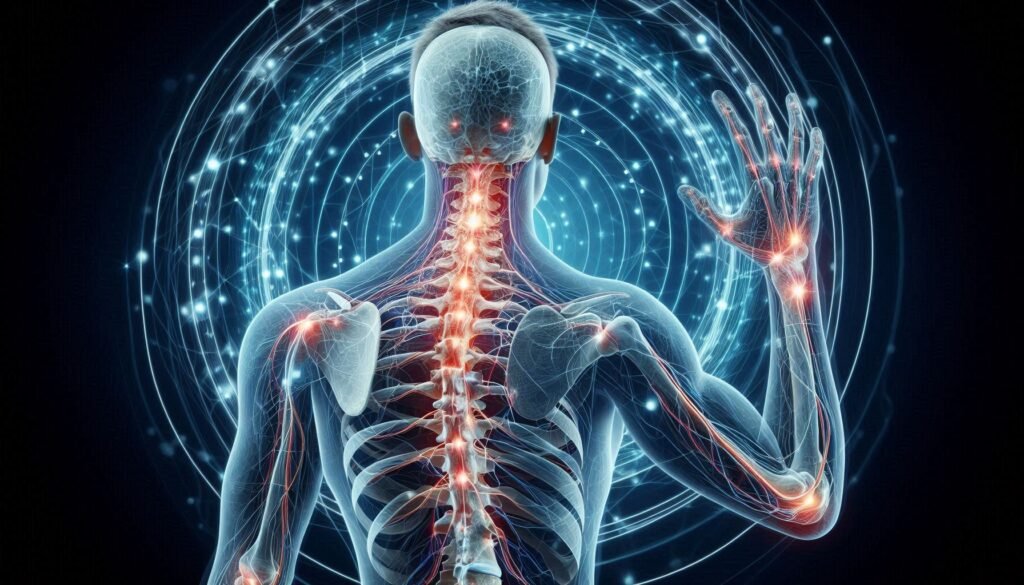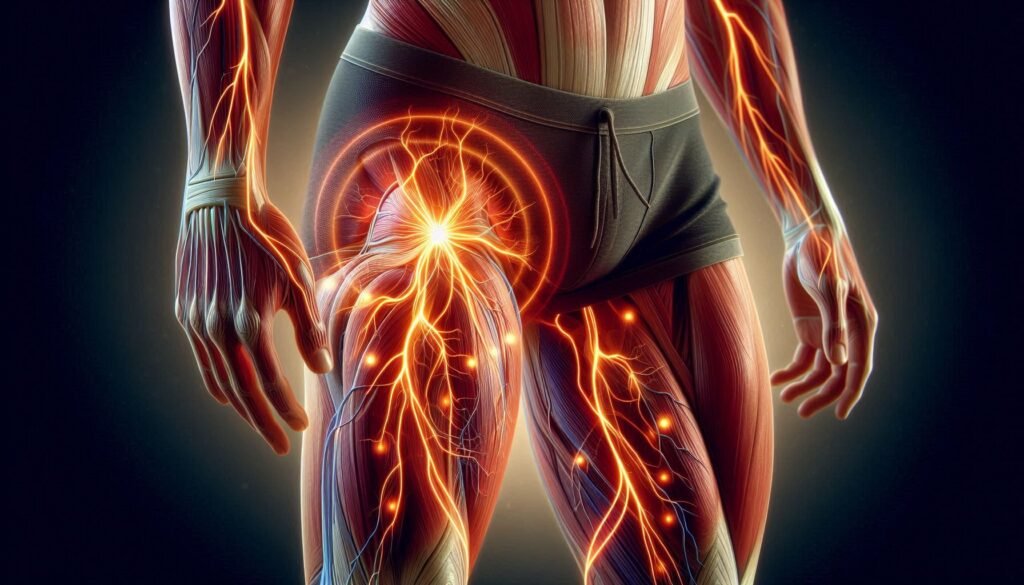Vitamin B12 plays a vital role in maintaining our overall health, especially when it comes to nerve function. Yet, many people remain unaware of the potential consequences of a deficiency in this essential nutrient. Among the various symptoms associated with low levels of Vitamin B12, paresthesia—characterized by tingling or numbness in the extremities—can be particularly unsettling.
Understanding how Vitamin B12 impacts nerve health is crucial for recognizing and addressing deficiencies. As we delve deeper into the world of Vitamin B12 deficiency paresthesia, you’ll learn about its symptoms, causes, and effective treatment options that can restore balance to your body.
Whether you’re experiencing unusual sensations or simply want to safeguard your health, this guide will provide valuable insights into ensuring optimal nerve function through adequate vitamin intake.

Understanding Vitamin B12 and Its Role in Nerve Health
Vitamin B12, also known as cobalamin, is a water-soluble vitamin essential for numerous bodily functions. It plays a critical role in the formation of red blood cells and DNA synthesis. However, its most significant contribution lies in maintaining nerve health.
This vitamin supports the myelin sheath—a protective layer surrounding nerves. The myelin sheath ensures proper transmission of electrical signals between the brain and body. When Vitamin B12 levels drop, this protective covering can become damaged or deteriorate.
A deficiency can lead to impaired communication within the nervous system, resulting in symptoms like tingling sensations or numbness known as paresthesia. This condition often manifests in the hands and feet but may affect other areas as well.
Moreover, adequate Vitamin B12 intake helps prevent neurological disorders that could arise from prolonged deficiencies. Understanding this nutrient’s role is crucial for recognizing potential issues before they escalate into more severe health concerns.
Common Causes of Vitamin B12 Deficiency
Vitamin B12 deficiency can arise from various factors that hinder the body’s ability to absorb this essential nutrient. One primary cause is inadequate dietary intake, particularly among vegetarians and vegans. Since Vitamin B12 is primarily found in animal products, those who avoid meat, dairy, or eggs may struggle to get sufficient amounts.
Another significant factor involves gastrointestinal issues. Conditions such as celiac disease or Crohn’s disease can disrupt nutrient absorption in the intestines. Similarly, surgeries that remove parts of the stomach or small intestine might impair B12 uptake.
Additionally, certain medications can interfere with Vitamin B12 metabolism. Proton pump inhibitors and metformin are common examples that may affect how well your body processes this vitamin.
Age also plays a role; older adults often experience decreased gastric acid production. This reduction affects their ability to extract Vitamin B12 from food effectively, leading to potential deficiencies if not monitored closely.
Recognizing the Symptoms of B12 Deficiency-Related Paresthesia
Vitamin B12 deficiency can lead to a range of neurological symptoms, with paresthesia being one of the most common. Paresthesia refers to abnormal sensations in the body, often described as tingling, prickling, or numbness. These sensations typically occur in the hands and feet but may also affect other areas.
Individuals experiencing this condition might notice feelings similar to “pins and needles.” This sensation can be uncomfortable and distracting. The onset may be gradual or sudden, depending on the severity of the deficiency.
In addition to tingling, some people report a burning sensation in their extremities. This symptom can interfere with daily activities and impact overall quality of life. Recognition is key for early intervention.
Other related symptoms may include weakness or difficulty coordinating movements. If you suspect vitamin B12 deficiency-related paresthesia, addressing it promptly is essential for preventing further complications.
How Vitamin B12 Deficiency Affects the Nervous System
Vitamin B12 plays a vital role in maintaining the health of our nervous system. It is essential for synthesizing myelin, a protective sheath that surrounds nerve fibers. Without adequate B12 levels, myelin production slows down, leading to potential damage and impaired neural signaling.
When vitamin B12 deficiency occurs, it often results in neurological symptoms such as numbness and tingling—commonly referred to as paresthesia. This happens because damaged nerves fail to transmit signals effectively. The sensations may begin in the extremities before spreading throughout the body.
Additionally, low vitamin B12 levels can affect brain function by causing cognitive decline and memory issues. In severe cases, it can contribute to mood disorders like depression or anxiety due to disrupted neurotransmitter synthesis.
If left unaddressed, these effects on the nervous system can lead to long-term complications. Recognizing these signs early is crucial for effective intervention and recovery from deficiency-related symptoms.
Risk Factors for Developing B12 Deficiency Paresthesia
Certain risk factors can increase the likelihood of developing vitamin B12 deficiency paresthesia. One significant factor is age. As people grow older, their ability to absorb vitamin B12 diminishes due to decreased stomach acid production and changes in gut health.
Dietary habits also play a crucial role. Individuals following strict vegetarian or vegan diets may not consume enough animal-based foods, which are primary sources of this essential nutrient. This dietary limitation increases the risk of deficiency over time.
Medical conditions can further exacerbate the situation. Disorders affecting absorption, such as celiac disease, Crohn’s disease, or pernicious anemia, hinder the body’s ability to utilize vitamin B12 effectively.
Additionally, certain medications can interfere with vitamin B12 metabolism. Drugs like proton pump inhibitors and metformin may impede absorption and contribute to lower levels of this vital nutrient in susceptible individuals. Being aware of these risk factors is key for early detection and intervention.
Diagnostic Methods for Identifying Vitamin B12 Deficiency
Diagnosing vitamin B12 deficiency involves a combination of medical history, physical examinations, and laboratory tests. Physicians often start by reviewing symptoms that may indicate low levels of this essential nutrient. Common signs include fatigue, weakness, and neurological issues like paresthesia.
Blood tests are crucial in confirming the diagnosis. A complete blood count (CBC) can reveal anemia typically associated with B12 deficiency. Additionally, measuring serum vitamin B12 levels provides direct insight into an individual’s nutritional status.
Methylmalonic acid (MMA) and homocysteine tests are also used for more accurate diagnosis. Elevated MMA or homocysteine levels suggest a functional deficiency even when serum B12 appears normal.
In some cases, further investigations like intrinsic factor antibodies may be conducted to rule out pernicious anemia—a specific cause of B12 malabsorption. This comprehensive approach ensures that healthcare providers accurately identify the root cause of symptoms linked to vitamin B12 deficiencies.
Treatment Options: Supplementation and Dietary Changes
For individuals experiencing vitamin B12 deficiency paresthesia, treatment primarily involves supplementation. Oral supplements are widely available and can help restore adequate levels of this crucial nutrient. Depending on the severity of the deficiency, healthcare providers may recommend high-dose oral supplements or even injections for a quicker response.
Dietary changes play an essential role as well. Incorporating more B12-rich foods into your diet can enhance recovery and prevent future deficiencies. Foods such as lean meats, fish, dairy products, and fortified cereals provide significant amounts of vitamin B12.
Vegetarians and vegans may find it particularly challenging to meet their B12 needs through diet alone because plant-based sources are scarce. For these individuals, fortified foods or regular supplementation is often necessary to avoid complications like paresthesia.
Regular follow-ups with a healthcare professional ensure that treatment is effective and adjustments can be made if needed. This approach helps manage symptoms while addressing underlying nutritional gaps effectively.
Managing Paresthesia Symptoms During B12 Repletion
Managing paresthesia symptoms during vitamin B12 repletion is crucial for comfort and recovery. Patients often experience tingling or numbness as the body responds to increased B12 levels. It’s essential to remain patient, as symptom relief can take time.
Incorporating gentle exercises can help alleviate some symptoms. Activities like stretching, yoga, or light walking improve circulation and nerve function. These movements encourage blood flow while promoting relaxation in affected areas.
Hydration plays a vital role too. Keeping well-hydrated helps maintain optimal bodily functions and supports nerve health. Drinking plenty of water may reduce sensations of tingling or discomfort related to paresthesia.
Be mindful of your diet during this period. Consuming foods rich in vitamin B12—like meat, fish, dairy products—along with supplements can expedite healing. A balanced diet not only replenishes nutrient stores but also provides the energy needed for overall wellness.
Long-Term Effects of Untreated B12 Deficiency on the Nervous System
Untreated vitamin B12 deficiency can lead to severe and lasting damage to the nervous system. One of the most concerning effects is peripheral neuropathy, which manifests as tingling, numbness, or weakness in the limbs. This occurs due to impaired nerve function caused by a lack of essential nutrients.
Additionally, prolonged deficiency can cause cognitive decline and memory issues. Nerve cells require adequate vitamin B12 for proper myelin sheath formation—the protective covering around nerves. Without it, communication between brain cells can become disrupted.
Furthermore, individuals may experience mood disturbances or even depression. The connection between vitamin B12 levels and mental health is significant; low levels have been linked to increased anxiety and depressive symptoms over time.
Chronic untreated deficiency might also result in irreversible neurological changes that affect balance and coordination. These complications highlight the importance of early detection and treatment for those at risk of vitamin B12 deficiency-related paresthesia.
Prevention Strategies: Ensuring Adequate B12 Intake
Preventing vitamin B12 deficiency and the associated paresthesia requires a proactive approach to dietary habits. It’s essential to incorporate adequate sources of vitamin B12 into your daily meals. Foods rich in this vital nutrient include meat, fish, dairy products, and fortified cereals. For those following a vegetarian or vegan diet, consider fortified plant-based milk or supplements specifically designed to provide sufficient amounts of vitamin B12.
Regular check-ups with healthcare providers can help monitor your levels if you’re at risk for deficiency due to age, medical conditions, or dietary choices. Additionally, some individuals may benefit from routine blood tests to detect low levels before symptoms arise.
For those who struggle with absorption issues related to certain gastrointestinal disorders—such as Crohn’s disease or celiac disease—working closely with a nutritionist can offer tailored strategies for maintaining healthy B12 levels.
Education about food labels is also important. Familiarizing yourself with which foods are fortified can empower you in making healthier choices that support nerve health. Staying vigilant regarding your body’s signals will aid in keeping potential deficiencies at bay and ensuring overall well-being is maintained effectively over time.


